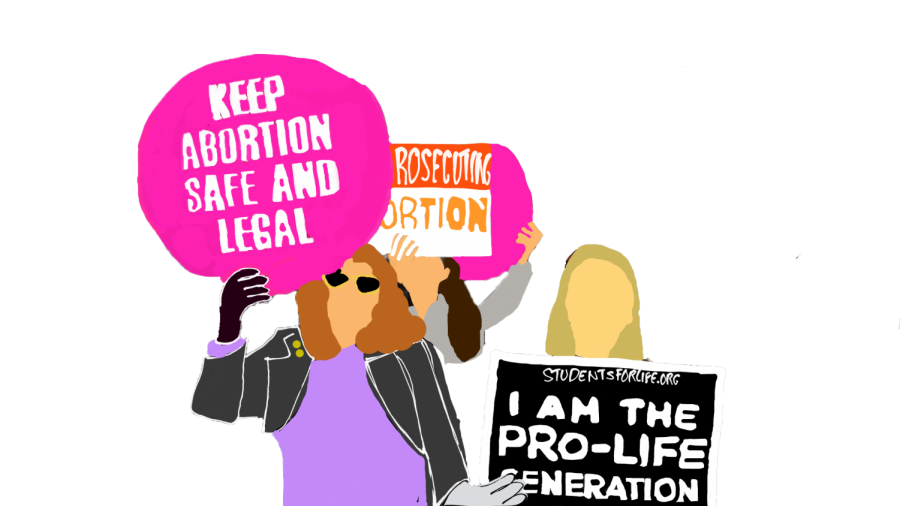OP ED: Why Maintaining Roe v. Wade is Vital Today
November 17, 2021
In the centuries-long struggle for women’s rights, Roe v. Wade was a pivotal moment. Decided in 1973, Roe v. Wade allowed for the protection of abortion rights, and removal of excessive regulations on a federal level for women in the United States. The turbulent political atmosphere of the 1960s provided women with this right, and it now seems in our modern day, that another turbulent political setting could take it away. The threat to abortion is an encroachment on gender rights. The protection of Roe v. Wade, and women’s abortion rights in the U.S is synonymous with the protection of personal liberty.
Using the pseudonym ‘Jane Roe’, Norma McCorvey, was a pregnant, single woman from Dallas seeking an abortion in 1969. A traditionally conservative and religious state, Texas saw abortion as a criminal offense, with few to no exceptions. McCorvey, when unable to terminate her pregnancy, sued the district attorney Henry Wade. Her fight against the accepted norms of the time, and her insistence on publicizing an issue that had plagued American women for centuries, yet was often whispered about or kept in the shadows, was an act of bravery and an historical leap towards the ruling of the constitutional right to choose.
Texas has not changed their political leanings very much in the past 40 years, and on September 1, new laws went into effect, effectively banning any abortion past six weeks. Before six weeks, few women are even aware of their pregnancy and this law practically outlaws it completely. It also enabled people to report traveling out of state for abortion to the authorities, making it impossible for any women living in state to be protected by national law. The conservative majority in Texas has titled this “the Heartbeat Act”, a guise of pro-life protection of the unborn. However, this provides no assistance for for women unable to provide, love, support or care to a child. In 2019, roughly half a million children were in the foster care system. A perhaps much more startling statistic is the near 12 million children who live below the poverty line in our country. Texas is also the leading state in child death from COVID-19, making it clear that the welfare of youth is not high on Texas’ list of priorities, but rather the restriction of women’s rights, and the overturning of our constitutional protection. Pro-lifers often hide under this guise of protecting the health of children, but are against the improvement of government welfare that could benefit the children that are already citizens of Texas. They are just as, if not more, entitled to care and protection than the fetuses that Texas is so keen to “save”.
Texas isn’t the only state to crack down on reproductive rights. Iowa and Mississippi are two red states who have been blocked by Supreme Court rulings in favor of protecting women’s constitutional rights. In 2018, in a case of Planned Parenthood vs. the State of Iowa, the state laws were deemed “unreasonably restrictive” of the constitutional right. They are now turning to the promise of a state constitutional amendment that would enable the majority of red states to create state laws regulating abortion. Iowa and Mississippi will face many obstacles in getting these laws passed, and the decision won’t be made quickly, but after seeing what Texas is capable of, and as more states rally behind the pro-life cause, the threat of liberty lost looms over the heads of women in this country.
A fatal flaw to the pro-life party, is that the GOP has failed to propose any solutions to the issue of abortion. Preventing abortion comes down to one simple fix: preventing unwanted pregnancy which can be fixed by providing more resources to family planning, sexual education, and childcare. If the rate of unwanted pregnancy is reduced, the rate of abortion will decline, and women will be able to provide for any children they want, or already have thus, improving the life and welfare of children in this country. These solutions may not appeal to a state like Texas or Mississippi, where opinions on birth control and sex education are dictated mainly by religious beliefs that dictate that birth control and sex education are strictly forbidden. It is imperative the GOP be reminded of a founding principle in the United States, the separation of Church and State. We live in a secularized country, where religion has no place in the making of laws, and the topic of sex, abortion, and birth control. These discussions must be debated, free from the dictations of a religious establishment. The personal choice of observing religion maintains one of free will in our country, so why should the choice of reproduction not remain the same?




